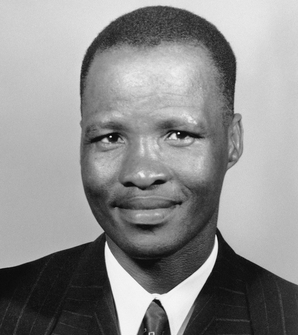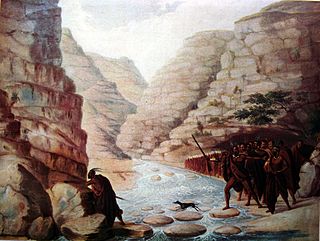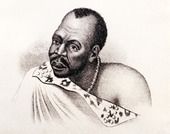
The Thembu are Xhosa people who were living in the Thembu Kingdom.

Chief Kaiser Daliwonga Mathanzima, misspelled Matanzima, was the long-term leader of Transkei. In 1950, when South Africa was offered to establish the Bantu Authorities Act, Matanzima convinced the Bunga to accept the Act. The Bunga were the council of Transkei chiefs, who at first rejected the Act until 1955 when Matanzima persuaded them.

The Xhosa Wars were a series of nine wars between the Xhosa Kingdom and the British Empire as well as Trekboers in what is now the Eastern Cape in South Africa. These events were the longest-running military action in the history of European colonialism in Africa.

Hintsa ka Khawuta, also known as Great or King Hintsa, was the king of the Xhosa Kingdom, founded by his great ancestor, King Tshawe. He ruled from 1820 until his death in 1835. The Xhosa Kingdom, at its peak, during his reign stretched from Mbhashe River, south of Mthatha to the Gamtoos River, in the Southern Cape.

King Sarhili was the King of Xhosa nation from 1835 until his death in 1892 at Sholora, Bomvanaland. He was also known as "Kreli", and led the Xhosa armies in a series of frontier wars.
Ngubengcuka Aa! Ndaba!, also known as Vusani, was the king of the abaThembu, in the eastern-southern part of Xhosaland. Ngubengcuka succeeded his father, Ndaba, as king in 1810. Known as Inkosi Enkhulu, Ngubengcuka united the Thembu kingdom before it was subjected to British colonial rule. He was the proverbial author and finisher of the modern kingdom that it eventually became.
The Rharhabe House is the second senior house of the Xhosa Kingdom. Its royal palace is in the former Ciskei and its counterpart in the former Transkei is the Gcaleka, which is the great house of Phalo.
King (iKumkani) Maxhob'ayakhawuleza Sandile was the son of the late King Mxolisi Sandile "Aa! Bazindlovu", who was the son of King Archie Velile Sandile, and Queen Nolizwe, the daughter of Western Mpondoland King Victor Poto Ndamase "Aa! Bhekuzulu", and sister to both King Tutor Vulindlela Ndamase "Aa! Nyangelizwe" and the wife of Chief Thandathu Jongilizwe Mabandla of the AmaBhele aseTyhume royal clan. He was the 9th descendant of King Phalo, the Son of King Tshiwo.

The Gcaleka House is the Great house of the Xhosa Kingdom in what is now the Eastern Cape. Its royal palace is in the former Transkei and its counterpart in the former Ciskei is the Rharhabe, which is the right hand house of Phalo.

The Ngqika people are a Xhosa monarchy who lived west of the Great Kei River in what is today the Eastern Cape of South Africa. They were first ruled by Rarabe kaPhalo who died with his son Mlawu, who was destined for chieftaincy. The clan would be named after Ngqika ka Mlawu, the son of the then late Mlawu. It would be years before the child would rule his people who fought in the Xhosa Wars, which were sparked by the encroachment of European settlers on Xhosa lands.
King Buyelekhaya Zwelibanzi Dalindyebo KaSabata, salutation name Zwelibanzi, is the king of the abaThembu people of South Africa since the late 1980s to present day. Dalindyebo is the son of the previous king of the AbaThembu King Sabata Jonguhlanga Dalindyebo, he is a direct descendant of King Dhlomu KaNxeko who founded the AmaDlomo dynasty, and currently the ruler of bakwaDalindyebo lineage.
Chief George Mzimvubu Mathanzima was a leader of the Transkei bantustan in South Africa, a young brother of Kaiser Matanzima and a nephew of Nelson Mandela. He and his brother, Kaiser co-founded and led the Transkei National Independence Party. Mathanzima was appointed as Prime Minister of Transkei after his brother became President. He served as Prime Minister from 20 February 1979 to 24 September 1987. Bantu Holomisa forced his resignation and exile in October 1987. Stella Sigcau succeeded him as Prime Minister, but Holomisa forced her out of office in a coup d'état and took power himself in December 1987.

Thembuland, Afrikaans: Temboeland, is a natural region in the Eastern Cape province of South Africa. Its territory is the traditional region of the abaThembu, one of the states of the Xhosa nation.

Sir George Edward Cory, was an English-born South African chemist and historian, best known for his six-volume publication "The Rise of South Africa".

King Madzikane was the founder and a King of the amaBhaca nation. He was the son of the Zelemu King Khalimeshe kaWabana.

Matiwane ka Masumpa, son of Masumpa, was the king of an independent Nguni-speaking nation, the amaNgwane, a people named after Matiwane's ancestor Ngwane ka Kgwadi. The amaNgwane lived at the headwaters of the White Umfolozi, in what is now Vryheid in northern KwaZulu-Natal. The cunning of Matiwane would keep the amaNgwane one step ahead of the ravages of the rising Zulu kingdom, but their actions also set the Mfecane in motion. After his nation was ousted from their homeland by Zwide with Shaka, Matiwane and his armies clashed with neighboring nations as he attempted to nourish his people. Eventually he fled South into lands occupied by abaThembu, amaMpondo and the neighboring Xhosa nations, which ultimately teamed up with the British and got his nation dismantled and scattered as smaller splinters at the Battle of Mbholompo in what is today Mthatha in the Eastern Cape. In his exodus from Mthatha, Matiwane and the biggest of the amaNgwane splinters was sheltered by baSotho but eventually had to return to his country, Ntenjwa, which he had settled briefly upon fleeing from his old country on uMfolozi omhlophe. Being back at Ntenjwa put a very much weakened amaNgwane and the king, Matiwane, within easy reach of the Zulu nation he had fled from. Matiwane had to then go make peace with the Zulu king, now Dingane, successor to Shaka. This despotic ruler put Matiwane to death shortly after Matiwane sought peace with the amaZulu.
Mbombini Molteno ka Sihele was a Xhosa Councillor and warrior, as well as the national poet ("imbongi") and cultural custodian of the abaThembu people of South Africa during the late 19th and early 20th centuries. He gathered and preserved Thembu history and lore from his base at the court of Chief Falo Mgudlwa in Ngcobo and he stewarded the different Thembu royal clans during a fractious and dangerous time.

The Mpondomise people, also called Ama-Mpondomise, are a Xhosa-speaking people. Their traditional homeland has been in the contemporary era Eastern Cape province of South Africa, during apartheid they were located both in the Ciskei and Transkei region. Like other separate Xhosa-speaking kingdoms such as Aba-Thembu and Ama-Mpondo, they speak Xhosa and are at times considered as part of the Xhosa people.











